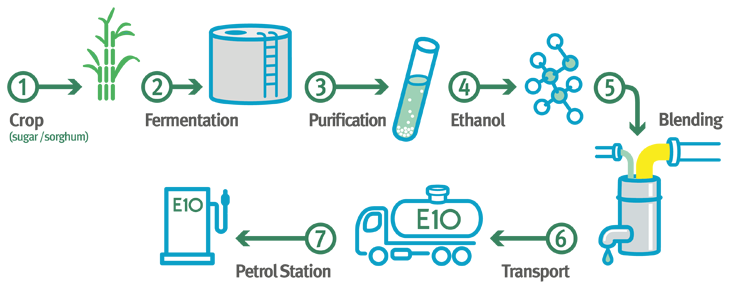E10 and the environment
The ethanol used in E10 is a renewable energy source produced in Queensland.
Biofuels that are produced and used sustainably are generally a lower-emission alternative to fossil fuels. Ethanol-blended fuels can produce up to 5% lower greenhouse gas emissions than conventional unleaded fuel—depending on the crop and technology used to make the fuel.
How E10 is produced
In Queensland, ethanol is made from molasses (produced from sugar cane) or grain. It can also be made from a range of other materials such as corn, beets or other energy-rich plants.
Manufacturing process
- Harvested sugar cane and sorghum are ground into a biomass mash.
- The mash is mixed with water and an enzyme.
- This mixture is fermented until ethanol (a type of alcohol) is produced.
- The ethanol and water mixture is purified using a distillation process.
- The ethanol is carefully blended with unleaded petrol in a 10% ethanol to 90% unleaded ratio.
- The fuel is transported to wholesalers and retailers.


Queensland biofuels mandate
The biofuels mandate commenced on 1 January 2017 and set minimum requirements for the sale of biobased petrol and biobased diesel.
Service stations who need to meet the mandate must ensure that ethanol makes up 4% of their total regular and ethanol-blended petrol sales, each quarter. For example, if 4 out of every 10 litres of regular unleaded petrol sold is E10 (which contains 10% ethanol) then the requirement has been met.
Motorists remain free to choose the fuel they use, based on suitability and personal preference.
This mandate has provided certainty for industry to invest, innovate and grow as part of a cleaner, greener future for Queensland.


